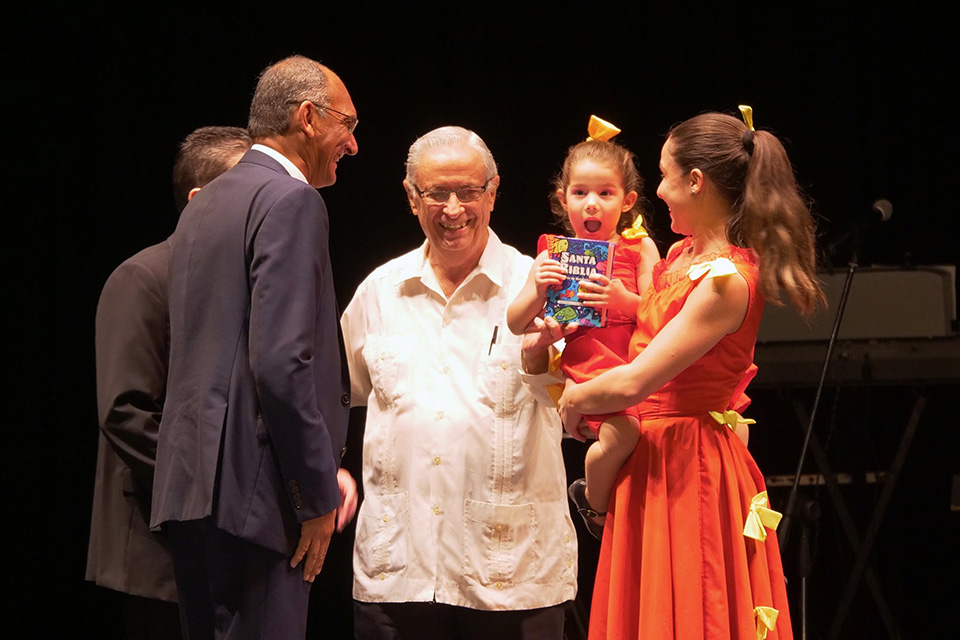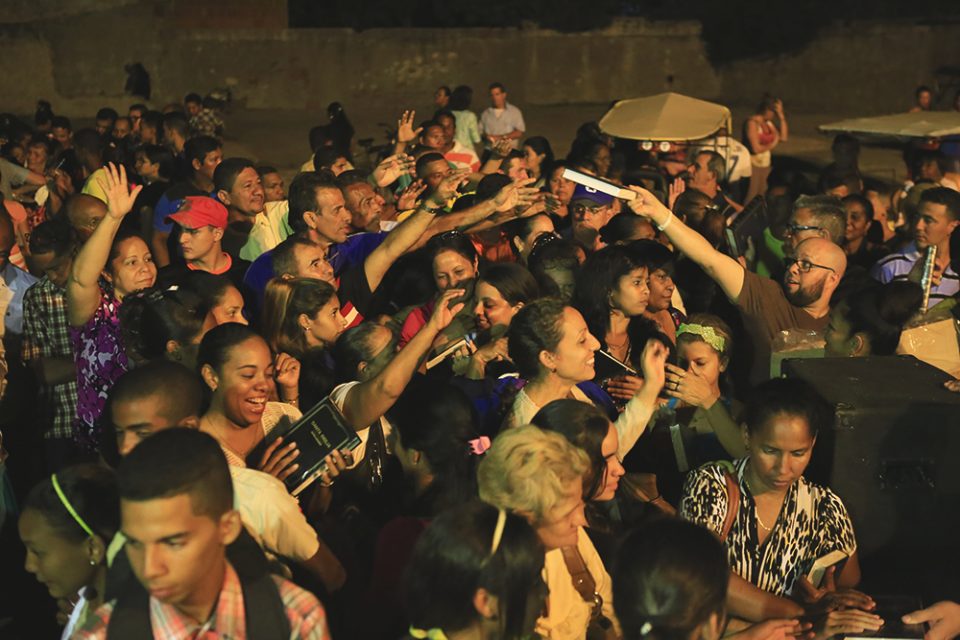
Since 2015, generous donors have partnered with the Billy Graham Evangelistic Association to help send Bibles to Cuba, a communist country that only recently lifted its ban on the importation of God’s Word. If you contributed to the Bibles for Cuba effort, thank you. You have played a vital role in building God’s Kingdom.
Christianity in Cuba can be boiled down to a simple introduction: His Name is Jesus.
Testimonies of changed lives, of healing, of provision fuel the Christ-centered revival that ignited decades ago and now simmers island-wide. The lifting of a 50-year-old Bible ban in 2015 ushered in the first real opportunity for Christians worldwide to chip in and send copies of God’s Word. Since then, more than 1 million Bibles have been donated. That includes you if you contributed to the Billy Graham Evangelistic Association’s Bibles for Cuba effort.
>> See photos of a Bible distribution in Cuba.
“I don’t know if this side of heaven we’ll ever know the ultimate impact this has made,” said Gary Lundstrom, international vice president with Billy Graham Evangelistic Association and Samaritan’s Purse. Generous donors to both ministries combined within the last three years to send 180,000 Bibles.
“People in Cuba are hungry for God,” offered David Isais, Global Generosity and Strategic Partnerships for the American Bible Society. “They are hungry for the hope of Christ.”

Sometimes, that hope starts with a real-life experience. A deathly sick or injured person is healed, for instance. Like any new believer in Christ, the depth of theology is lacking, but the thirst is just as insatiable as their desire to tell everyone they meet.
“You have that intimacy with Christ. You’ve had that experience, how do you nurture that?” Isais asked. “How do you grow? If they don’t have access to the Word of God, how do they deepen themselves? They just hang on to that hope. That’s all they have.”
A Special Thank You for All Donors:
“By you being a part of this, by you helping get the Bibles for Cuba, you have literally been God’s answer to prayer. You have been a vehicle of blessing by your obedience, by your faithfulness. God put that call on your heart. It was God who said, ‘Why don’t you send that?’ It was God who orchestrated it all because He heard a people cry out that said, ‘Lord, we need You. Provide Your Word for us.’
“And God has moved you. Wherever you are, God put a call on your heart.
“When you recognize the historical nature of this moment, you just have to sit back and go, ‘Wow, God. I get to be part of Your plan?’ That’s awesome.’ Thank you.” – David Isais, American Bible Society
The Bibles that exist are used every single day in this communist Caribbean island where literacy tops 97 percent. Covers wear off in the humid summers as people carry them wherever they go thanks to looser governmental restrictions. The dream is for every one of Cuba’s 11 million populace to have a Bible, but in the meantime Cubans share. It’s just their way with everything and God’s Word is no different. Sometimes Bibles are split up for families to take and then trade a book. Sometimes the Scriptures are fragmented down to just a scrap.
Cuban Christians cling to that piece of paper and memorize what’s on it. Often, Isais said, they can quote Scripture back to you. But without the overall Bible, the context is missing.
“Having access to Scripture, having it in their hand amplifies their understanding of what those verses mean,” Isais said.
Still there’s life in the Word and many Christians in Cuba gather every Sunday in government abiding structures—whether that’s a home or a separate building altogether—for church. Services are packed and Cubans sometimes stand shoulder-to-shoulder, sweat pouring as the music blares. It’s as sincere as it is intense. And it’s personal. After all, His name is Jesus.
During the Bible distribution, local churches find that those who believe, believe absolutely even without a copy of God’s Word to look up answers to their questions. So they believe absolutely in faith that God will provide. And they pray.
That was the case for an elderly woman, who simply believed and simply prayed fervently that God would send her a copy of His Word.
“We gave her a Bible, and she was ecstatic,” Isais said before elaborating the typical response from most Cubans:
“They embrace the Bible. They cry. They kiss it like a lost child. They hold it in their arms and they just hug it.
“It’s God’s answer to their prayers. They feel loved, they feel cared for, they feel blessed, they feel answered. There’s such a joy in their hearts and there are no words to describe that.”
And it’s a concept that many in the first world can’t appreciate. With one click, consumers too busy to drive to the store can have their perfectly chosen Bible delivered to their doorstep within 24 hours.
In Cuba, Bibles aren’t sold in stores or available online. In Cuba, Christians simply wait on the Lord instead of a prime delivery.
“When you can’t control the outcome, you’re just solely dependent on whatever God throws your way—whether it’s a paper Bible, blue or black or red or little or large print or small print, it doesn’t matter—you’re just happy to get it.”
The thrill isn’t limited to the older population either. Children, too, understand what’s going on.
Earlier this month, during the millionth Bible celebration, local pastors asked a 4-year-old girl to come onstage. She hid behind her mother, even when she learned they had a gift for her.
“As they hand the Bible to her, she literally becomes the life of the party,” Isais remembers. “She comes out of her shell, she’s showing it to the whole world. She’s embracing it. She’s hugging it. She knows what the gift is. It’s a children’s Bible. And it’s her very own.”


